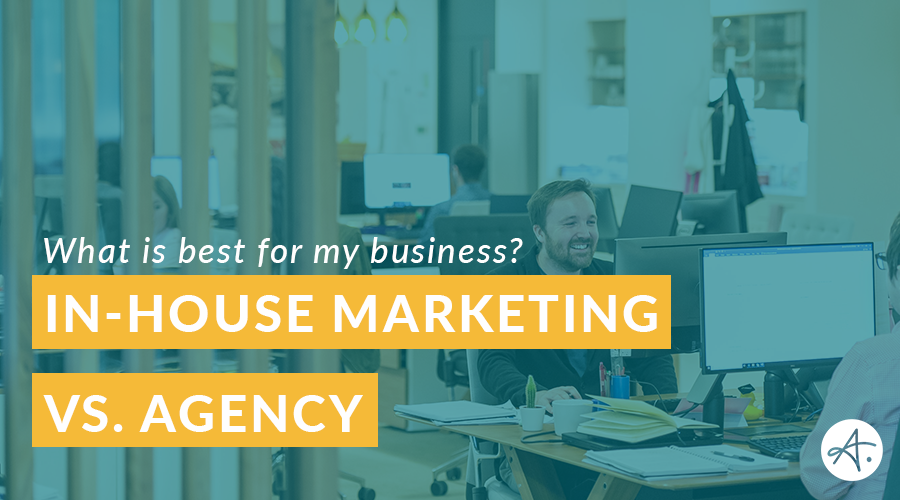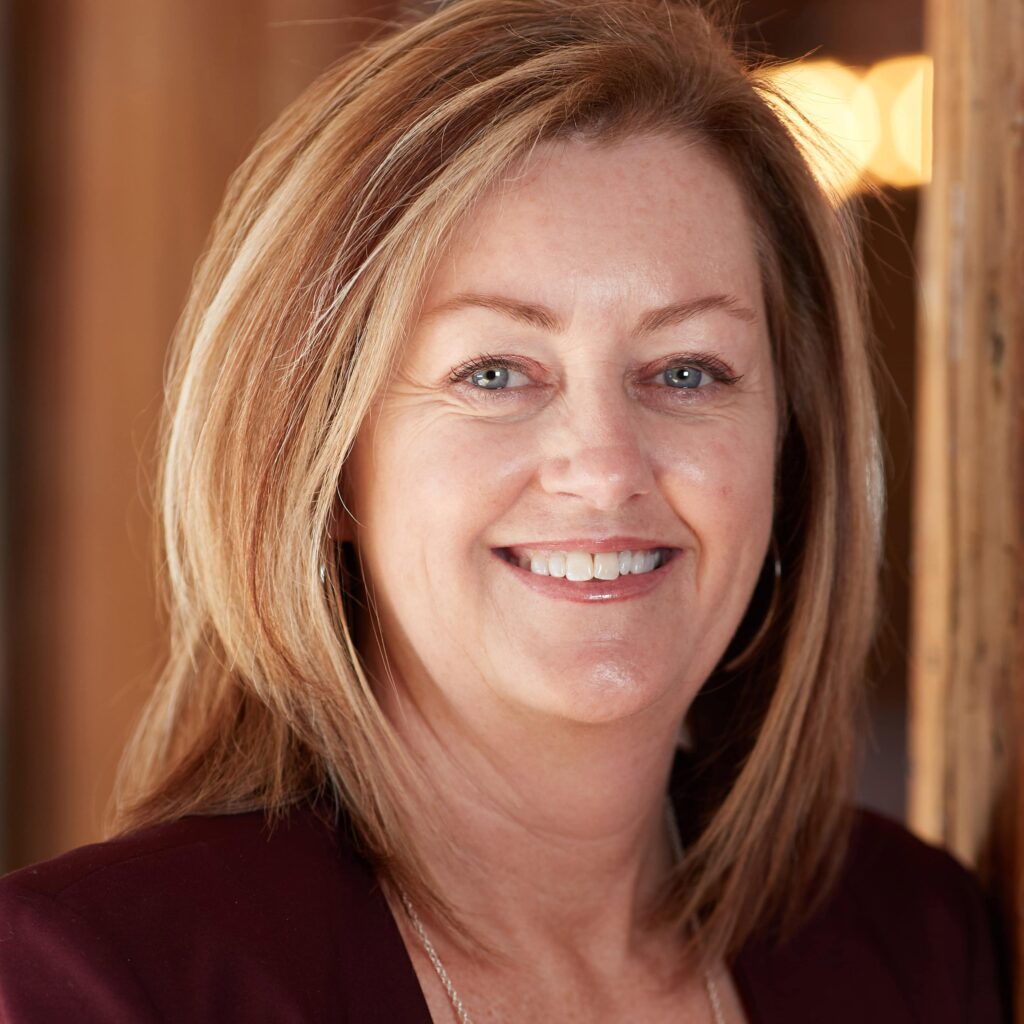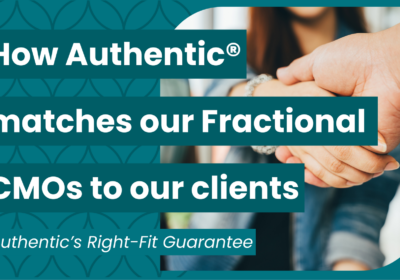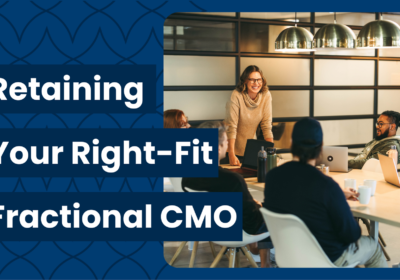
There comes a time in every business’s lifecycle when it needs to invest in marketing to continue growing. Some of the most important decisions are when and who to hire to develop and manage your marketing programs. Your business has what seems like endless options: in-house marketing vs. agency, consultant, or freelancer.
But these resources also vary in their seniority and experience in various functional areas (e.g., digital, content, analytics, traditional). Without strategic marketing leadership at the helm, it can feel impossible to make sense of all of the options available and which are the right resources for your business.
In this month’s virtual panel, we interviewed Authentic Fractional CMOs, Tracy Steeno and Barb Bertsch, plus Authentic’s VP of Client Services (a former CMO herself), Meg Van Sloun. We asked the panelists for advice on how businesses can effectively resource their marketing team while considering in-house marketing vs. agency, consultant, or freelancer.



How can a business make sense of all of the roles they could hire for in marketing to determine who they actually need?
Tracy
Once a company determines its needs based on its business objectives, the marketing roles and functional requirements become more apparent. For example, if a B2B organization’s goal is to double its customer base in the next three years, it would need marketing to generate a healthy sales pipeline of qualified leads that will drive sales conversions. Certainly, that’s not all the business likely needs from marketing, but armed with this foundation, it helps the company gain clarity.
Then, companies can go a couple of ways: either handle the process themselves by researching, scoping, vetting, and hiring; or identify an outside resource to lead this process. This is where a seasoned marketer like a Fractional CMO can add tremendous value to your organization. You may not need this senior-level role forever, nor full-time, but the upfront investment is well worth it. Rely on this senior marketer to identify the roles, systems, structure and budget, as well as provide needed strategic leadership to achieve your goals and avoid elongated processes, potential mistakes, and even under-investing at a critical time. Don’t make the mistake of hiring a fresh digital marketer because you think that’s what you should do, and then expect that person to magically meet all your marketing needs.
Barb
I think it really depends on the goals of the organization. What is the growth plan, and where do you see growth coming from? Based on that, I would ask, do we think the person we have here (or not) today can make that happen? In today’s marketing environment, there is no “jack of all trades” marketer, or what we marketers affectionately refer to as a “unicorn.” There is too much to know, and it changes constantly. For example, does it make good business sense to focus solely on social media marketing to build growth and align with the business plan? Probably not.
When looking to hire a marketer, I suggest you begin by tapping your network. Ask other business leaders whom you respect and who have experienced recent growth what has worked for them. I see all too often that small businesses rely on one individual to perform marketing tasks randomly based on sales needing this collateral or that social post. Or a senior leader saying, did you see what so and so (competitor) is doing? Let’s try that. What’s most important is that your marketing aligns with your business plan, sales targets, and growth goals. Seek out the advice of senior marketing leaders and have a conversation about where you are and what they would recommend. A Fractional CMO can make sense of the business, define the marketing strategy, build a plan, and assess the structure needed to activate and manage that plan.
Meg
First and foremost, I agree with Barb that everyone in your business needs to have a crystal-clear picture of what success looks like for your company. What is the goal (“North Star”) that you are all reaching for? No company has an endless supply of resources (e.g., time, money, and human energy). This is where having a strategic marketer in place is going to set you up for success. The strategic marketer’s primary role is to create clarity regarding what you “should be doing” vs. “could be doing” to meet your company goal(s). The next — and almost equally important job — is to assemble the best version of your dream team to bring the plan to life as effectively and efficiently as possible. You can have the most brilliant marketing plan, but without the right bench strength (i.e., the right executional marketing resources) to help bring things to life, the plan remains just a plan.
Some companies choose to invest highly in their in-house marketing teams. However, the world of marketing is changing so quickly that it is hard to stay on top of everything and do it well. Barb summed it up perfectly: “Marketing unicorns simply don’t exist.” So I think more often than not, bringing some outside talent in to at least help augment your team is a valuable approach to running a successful marketing team. The right external partners can bring valuable new insights and learnings to your business, which not only will enhance the work but also can strengthen your team. You reap the benefit of getting your marketing engine moving forward faster, in the right direction, with the added benefit of investing in your team. It’s often a win-win.
Even with a dedicated marketer in-house (whether full-time or part-time), a company’s marketing needs to evolve over time. How can a company identify which skills it truly needs in-house, and which are best outsourced to a freelancer or agency?
Barb
Smart marketing planning from the beginning will help smooth this transition and make it easier to recognize which skills you need in-house or externally. If the team has solid metrics in place, you can examine current processes and progress, see where you can streamline, and determine which efforts drive a positive ROI. Cut back on what is not working well, and from there, take what is working well and leverage that to determine where you could use more help. Then, determine where it will come from, whether it be an in-house marketing hire or an outside consultant or agency.
Think about the team or individual in place today and assess whether or not they are equipped to handle a ramp-up without neglecting projects already in place. This is where having at least a three-year business plan in place, along with a more future-looking, 10-year plan, makes good sense. How and where does the business need to scale to gain next-level growth? This is going to determine future resourcing across all functions within the organization.
Meg
I often tell people that marketing is not a great career choice if you are not a continuous life learner. The world of marketing is constantly changing at an increasingly fast rate. So to stay up on everything is quite difficult. The smartest and best marketing teams are continuously evaluating what they will need in the future vs. what they simply need today. Often good marketers stay at a company for a few years, learn what they can and then move on to greener pastures to learn more and expand their experiences. Companies can choose to invest highly in their in-house marketers (to try to coax them to stay) or choose to augment their team with outside experts that continually bring new outside learnings and insights to the table that can help you move further faster.
Much of the in-house marketing vs. agency or freelancer decision depends on your budget and speed tolerance. If you desire to move in the right direction fast, hiring some outside experts will likely get you to where you want to go faster. It is often not less expensive to hire external talent, but it is usually a less risky and faster impact option.
At the end of the day, there is no one perfect recipe on how to best resource your marketing needs. It takes time to develop the right mix of resources. However, I think the GWC™ tool from EOS®1 can be a powerful tool when assessing your team. GWC stands for Get it, Want it, and Capacity to do the job. As you are looking for the right resources, either for your team or through external partnerships, the answer should be yes to all three questions. Do they: Get it? Want it? Have the capacity to do the job?
Tracy
I think a company needs to look at where it’s going and what marketing must achieve for the business in the coming years. Then determine if they have the people and processes in place to support the vision. If not, think in terms of specialty areas like SEO, website development, or even creative services — areas that will bring lots of value when outsourced to experts. Keep in mind that it’s important to have a seasoned marketer to manage agency relationships, someone who has a solid understanding of how agencies work and how they can add value to the business. I am a proponent of having a mix of in-house and external resources, which enables businesses to flex up or down and leverage marketing specialties.
Most companies will employ external marketing capabilities along the way — either for short-term, specialized projects or for ongoing production support. What are the most important attributes to look for in an external partner, whether a freelancer or an agency? What red flags should they watch for?
Meg
I think a good partner is respectful of your team, your time, and your budget. They align with your values, demonstrate proven expertise (e.g., their clients are raving fans), collaborate well with your team and your partners, and invest in your team by teaching them “to fish.” Good partners are also transparent in everything that they do (e.g., their work and SOW) and make your team feel heard while also thoughtfully challenging them along the way to make the work even stronger.
I think red flags include partners who treat your team and your work as a transaction vs. an investment. They don’t work well with your team or other agency partners, don’t make your team feel heard, work in a vacuum, and are unwilling to share any of the “how the sausage is made” work with your team. Red-flag partners create confusing SOWs that they are unable or reluctant to take the time to clarify for you.
Tracy
Authentic clients value when their Fractional CMO recommends specific freelancers or partners that Authentic has carefully vetted, thus circumventing much of the standard due diligence process. Still, it’s important the agency or freelancer must be a good fit with your organization and culture, and there’s no better way to assess this than to meet them.
For businesses handling agency due diligence, be sure to clarify who would be working on your business. And understand how the agency works. What processes do they follow from project initiation to completion? How will they manage change? What reporting will they provide? How often will they meet with you? What is included, and what is not included? How flexible are they? Be sure to set clear expectations from the onset and articulate what success looks like for your business. Your partners will thank you, and you’ll get what you expect.
Barb
What I have found with outside partners is that you can tell fairly soon which ones are true partners for you and the business and which ones are there to check a box based on the SOW. Red flags for me are a lack of responsiveness and an unwillingness or inability to be flexible. Obviously, do your due diligence when considering bringing in partners. Ask your network about them, see what they are doing on LinkedIn. How do their core values align with your business? Do they tend to focus their work on smaller or larger organizations?
In smaller organizations, as the marketer brings in the partner, vet them first and then when you feel it is appropriate, have them meet with the leadership team. Leadership buy-in and alignment with the partner are key. It might be better as a small business to work with a smaller agency that is nimble and more cost-effective for your business. They understand growing a small business because they are one.
Is your business missing the strategic guidance it needs to decide whether it needs in-house marketing vs. an agency, freelancer, or consultant to fuel its marketing programs? Our Authentic Fractional CMOs know how to build marketing teams and programs to achieve business objectives with the right skill sets.
Let’s connect to discuss how one of our strategic leaders can help you build your marketing dream team, whether it’s in-house staff, external partners, or a combination of both.
1. Entrepreneurial Operating System® and EOS® are registered trademarks of EOS Worldwide.







